Best Dijon Mustard Substitute (Recipe + Alternatives)
Make your own Dijon mustard substitute with ingredients you already have with this easy recipe. You won’t tell the difference! Or find more substitutes and alternatives for Dijon mustard to suit your pantry.
Have you ever been in the middle of making a salad dressing, only to realise you’re out of Dijon mustard? Or maybe you’re just not in the mood to run to the grocery store? No need to worry! This easy Dijon mustard substitute has you covered.
You can create the best substitute for Dijon mustard with just a few ingredients and less than 10 minutes of your time. You only need mustard seeds, sea salt, white wine vinegar and water.
Or try another type of mustard as an alternative to Dijon mustard. Keep reading for an overview of different types of mustard and more suitable substitutes. You are sure to find the perfect replacement to suit your pantry and taste preferences.
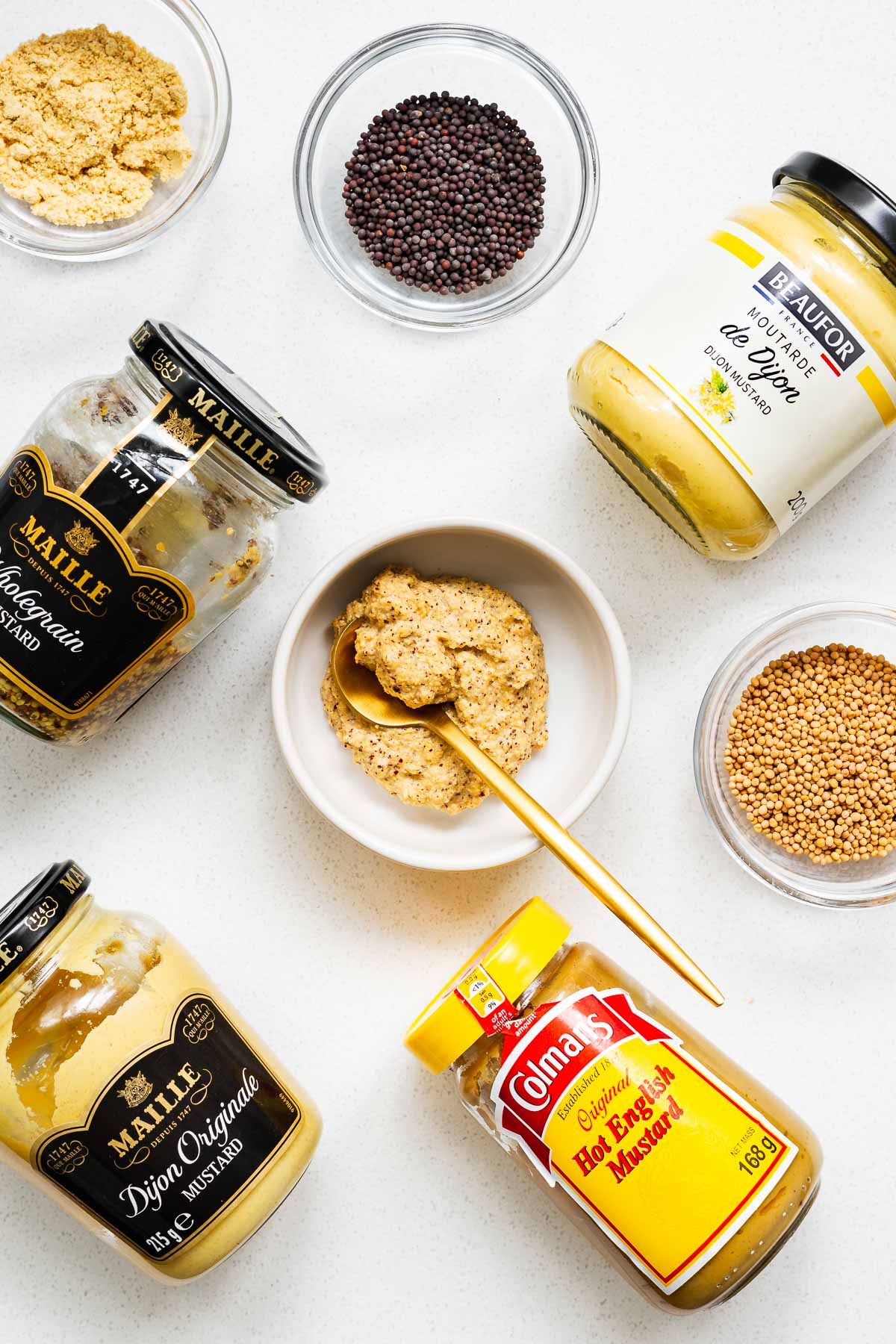
What is Dijon mustard?
Dijon mustard (Moutarde de Dijon) is a classic French condiment of ground whole mustard seeds, vinegar or white wine, and salt. It is available as a whole-grain, stone-ground or smooth mustard. Smooth and creamy Dijon mustard is the most common.
The smooth mustard has a dirty yellow colour and a distinctive flavour that is more tart and pungent than regular yellow mustard (which has added spices and flavouring). Dijon mustard is a popular base for honey mustard and other speciality mustards.
And while it is easy to make authentic Dijon mustard from scratch, this process requires a few days for the mustard seeds to soak in the vinegar and wine.
If you have the time, try this whole-grain Dijon mustard recipe (via Serious Eats). Or, try any of the Dijon mustard substitutes we list below for a quick fix.
Typical Dijon mustard ingredients
Dijon mustard is a smooth and creamy condiment typically made from two main ingredients – mustard seeds and white wine (or white wine vinegar).
Mustard seeds are the main ingredient in Dijon mustard – traditionally brown mustard seeds. But today, it can be yellow, brown or black mustard seeds. Yellow is the mildest, with a sweet and nutty flavour. Brown mustard is more intense and spicy. Black mustard is the strongest, with a pungent and sharp flavour.
In addition to ground mustard seeds, white wine adds a distinct flavour and mild acidity.
And vinegar, usually white wine vinegar, adds tartness and extra acidity.
Our easy homemade Dijon mustard recipe uses these main ingredients to achieve true Dijon mustard flavour in less than 10 minutes.
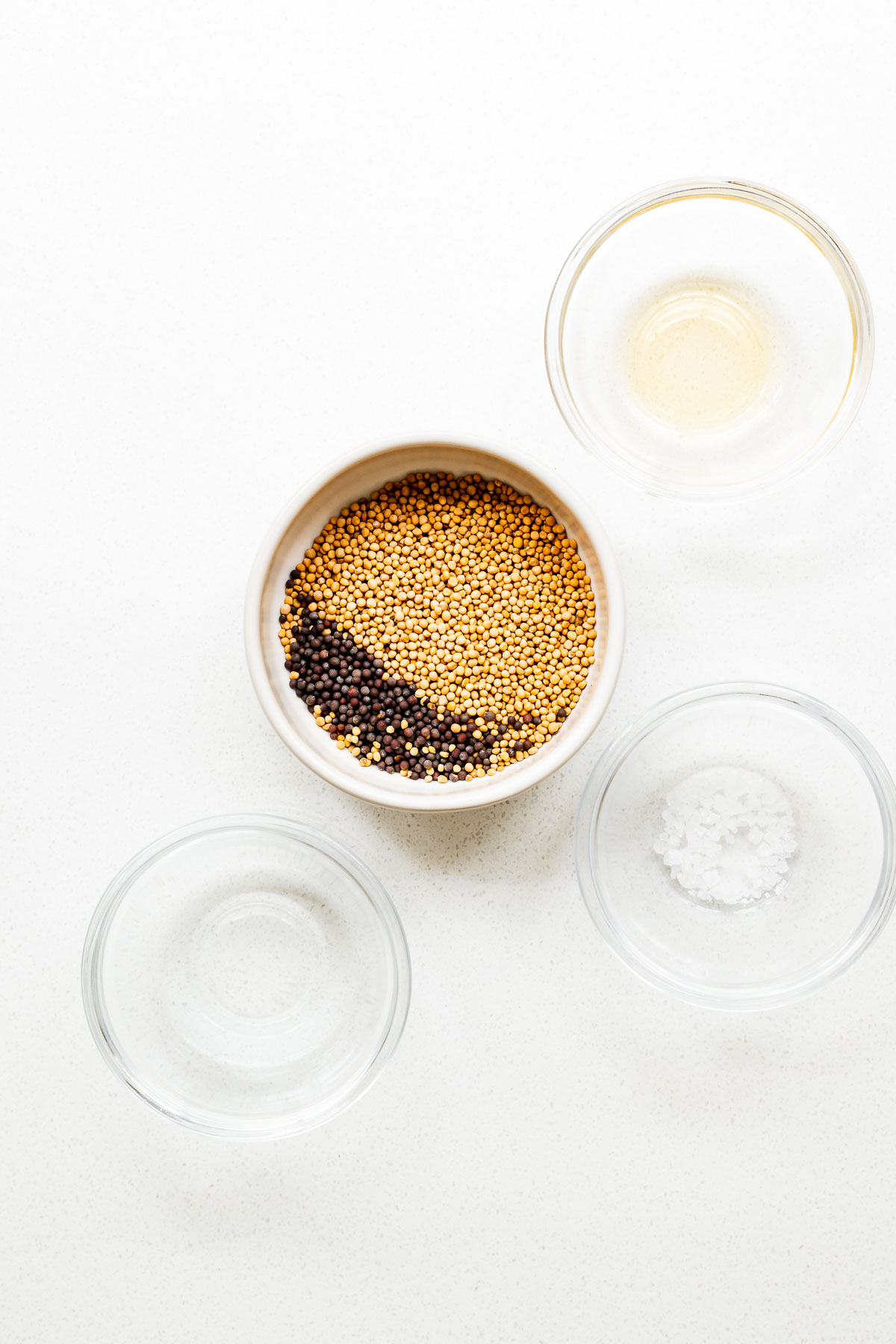
The best substitutes for Dijon mustard
You don’t have to miss out on flavour when you find yourself without Dijon mustard. Our homemade Dijon mustard substitute is the perfect alternative. It’s easy to make and requires only mustard seeds, vinegar and salt.
But if you don’t have those ingredients on hand, we also look at different types of mustard as a substitute for Dijon mustard:
- Mustard powder
- Yellow mustard
- Whole-grain mustard (a similar natural mustard flavour)
- Creole mustard (a great substitute in flavour and texture)
- Spicy brown mustard
- Hot English mustard
- German mustard
- Honey mustard (a sweeter alternative)
- Beer mustard
Mustard gets its pungent, spicy kick from the AITC (allyl isothiocyanate) compound. This compound also occurs in horseradish and wasabi. So, if you’re after that specific mustard kick, but don’t have any mustard products, wasabi and horseradish will do the trick.
And if you’re looking for a Dijon mustard alternative that will spare you the mustardy burn, try a mix of turmeric, chilli pepper, and garlic. Or use mayonnaise as a base for your dressings or spread, and build it with layers of heat and spice.
I’ve also seen recommendations to use Worcestershire sauce as a Dijon mustard substitute. But I just don’t see it. MAYBE if you mix it with mayonnaise and wasabi? Even then, I think there are much better alternatives suggested below.
So, don’t let a lack of Dijon mustard put a halt to your cooking. With these Dijon mustard alternatives, you can still get that same sharp, tangy flavour.
Homemade Dijon mustard substitute
Traditional Dijon mustard ingredients include brown mustard seeds, white wine, vinegar and salt. And this easy Dijon mustard substitute recipe is the perfect way to recreate the classic flavours at home when you’ve run out.
To make two tablespoons of Dijon mustard substitute:
- Grab a spice grinder or mortar and pestle and grind four teaspoons of mustard seeds with a quarter teaspoon of salt until fine. The finer you grind the seeds, the smoother the mustard will be.
- Mix the mustard seed powder with one and a half teaspoons of white wine vinegar and four teaspoons of water. Add more water – one teaspoon at a time – if the mixture is too thick.
- Let the mustard mix sit for at least five minutes before using.
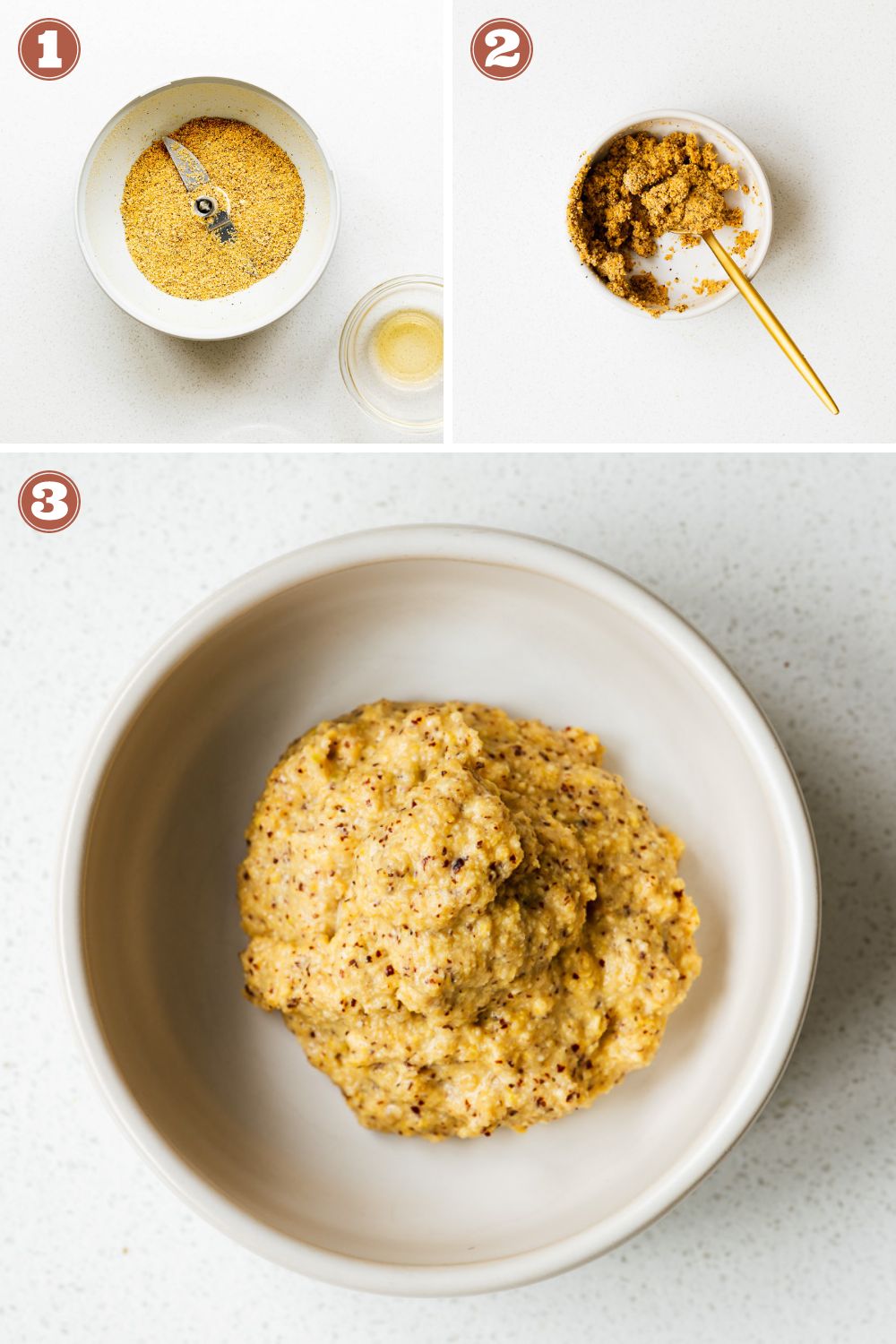
I like to mix yellow and black mustard seeds for my Dijon mustard, but brown mustard seeds will give you the classic spicy pungent flavour of Dijon mustard. You can also use only yellow mustard seeds for a milder mustard flavour.
If you don’t have a pestle and mortar or spice grinder, you can use dry mustard powder instead of mustard seeds. But the result may be closer to yellow mustard than Dijon mustard. Shop-bought mustard powder can contain turmeric and other flavourings that mellow the spicy natural mustard flavour.
See the Dijon mustard recipe card for more.
Use this prepared mustard as a direct substitute for Dijon mustard.
Dry mustard powder
Mustard powder (or ground mustard) is a great substitute for Dijon mustard, especially in sauces, salad dressings and marinades. It is a dry product made from ground mustard seeds, unlike prepared mustard which refers to the condiment.
But shop-bought mustard powder can also have added flavouring and colourants, like turmeric. And the flavour is milder than prepared mustard.
To make Dijon mustard from dry mustard:
- Mix one part mustard powder with two parts liquid to create a paste. Use water, wine, or even beer.
- Add more liquid until you’ve reached the desired consistency. Then, once you’ve made a paste, let the mixture sit for five minutes.
- Then season with salt to taste. You can add a pinch of brown sugar to balance the tartness.
Use the mustard paste from dry mustard powder as a direct substitute for Dijon mustard in recipes. Or use one teaspoon of mustard powder to replace a tablespoon of Dijon mustard.
Honey mustard
Honey mustard is a popular condiment made from honey, mustard, and other ingredients like vinegar and spices. The sweetness of the honey mellows some of the spicy mustard flavours. It’s a great substitute for Dijon mustard if you prefer a less pungent mustard.
Use shop-bought honey mustard or make a simple honey mustard substitute by mixing a teaspoon of honey into a tablespoon of prepared mustard. Add a tablespoon of vegetable oil to the mix if you want a smoother condiment. You can also add a bit of paprika or cayenne pepper for extra flavour and colour.
Use honey mustard in place of Dijon mustard in dressings, marinades, and sauces. It’s also great as a dipping sauce and in sandwiches. Why not try a spicy hot honey mustard next?
Just remember that honey mustard is much sweeter than Dijon mustard.
Yellow mustard
Yellow mustard is milder and sweeter when compared to Dijon mustard. It also has a thinner texture. And while Dijon mustard contains mainly mustard seeds and wine or vinegar, yellow mustard can contain lots of extra spices and flavouring – such as turmeric, paprika and garlic.
Though I prefer the more natural mustard-flavoured types of mustard as alternatives to Dijon mustard, yellow mustard makes a decent substitute for Dijon mustard when you’re in a pinch.
Add a pinch of salt, and some white wine vinegar for a closer flavour match to Dijon mustard. You can also mix in ground mustard seeds for a more pungent mustard.
Use this mixture of yellow mustard as a 1:1 substitute for Dijon mustard.
Whole-grain mustard
Whole-grain mustard is a great alternative to Dijon mustard.
Smooth Dijon is made with white wine and finely ground mustard seeds. For whole-grain mustard, the mustard is coarsely ground and mixed with vinegar or other acids like lemon juice.
Whole-grain mustard has a sharper, more robust flavour than Dijon. And it’s great in salad dressings or as a condiment. While the texture is different, the flavour is deliciously pungent and mustardy.
Use whole-grain mustard as a direct substitute for Dijon mustard. Or, if your whole-grain mustard is particularly strong, mix it with honey or maple syrup, a splash of white wine vinegar and a little salt. This will help to mellow out the strong flavour of the mustard.
Spicy brown mustard
Spicy brown mustard has a creamy texture and a spicy kick. It is usually made with ground mustard seeds, vinegar, and spices. The spices can vary but generally include garlic powder, turmeric, paprika, and cayenne pepper.
White distilled vinegar also adds a sharper acidity compared to the mellow white wine vinegar in Dijon mustard. And the added spices have a major impact on the flavour.
But you can still use spicy mustard instead of Dijon mustard in any recipe that calls for it. Your dish will just have a spicy chilli kick infused into the mustard flavour.
Hot English mustard
Traditional hot English mustard is a spicy, pungent preserved mustard made from powdered English mustard seeds. It packs a hot punch and is the perfect substitute for Dijon mustard when you’re in a pinch.
You can buy English mustard as prepared mustard or in dry powder form.
To use English mustard powder as a substitute for Dijon mustard:
- Mix the mustard powder with a splash of white wine vinegar.
- Add white whine vinegar and cold water until it has a paste-like consistency.
- Season with a pinch of salt.
- Then let the mixture sit for 10 minutes to unleash its potent flavour.
To mellow the more intense heat of hot English mustard, add more white wine vinegar and a bit of honey.
When you use hot English mustard as a substitute for Dijon, the spicy mustard taste will be stronger. So, start with half the quantity of Dijon mustard your recipe calls for. Then add more to taste.
German mustard
The ingredients in German mustard vary greatly. Mustard is ubiquitous in German cuisine; different regions and speciality dishes use different mustards. And it can range from mild and sweet (thanks to honey or applesauce) to hot and pungent.
To use German mustard as a substitute for Dijon mustard, it is best to adjust the mustard to taste.
Too sweet? Add a splash of white wine vinegar and a pinch of salt. Too mild? Mix in mustard powder, cayenne pepper or a few drops of hot sauce.
Mix the ingredients until combined, and use the mixture as a 1:1 replacement for Dijon mustard.
Creole mustard
This prepared mustard from the Southeastern region of the United States is an excellent substitute for Dijon mustard. It typically contains coarsely ground brown mustard seeds and white wine vinegar, making it a great flavour match for Dijon mustard.
Use Creole mustard as a direct Dijon mustard substitute in sauces, vinaigrettes or any recipe calling for Dijon.
Beer mustard
Beer mustard, as you can guess, is a mustard made with beer instead of vinegar. It has a unique flavour that is both sweet and tangy. And it provides a depth of flavour when mixed into condiments.
It has a very different flavour profile from Dijon mustard. It is much sweeter and less pungent. But it can add a delicious and interesting twist – both in cooking and as a condiment.
Beer mustard is also great on sandwiches, in salad dressings, and as a dip for pretzels and chips – similar to honey mustard.
To use it as a substitute, simply replace the Dijon mustard in your recipe with an equal amount of beer mustard.
Turmeric, chilli pepper, and garlic
While other types of mustard make the best substitute for Dijon mustard, you can use this simple spice mix if you don’t have any suitable mustard substitutes. Or if you don’t like the spicy, pungent flavour of mustard.
Though if you want a close flavour match to Dijon mustard, you are better off making a homemade Dijon mustard substitute or using Creole mustard, or whole-grain mustard.
The turmeric provides a mild, earthy flavour, chilli pepper adds a nice kick of heat, and garlic powder boosts the savouriness of the blend.
To make the mustard substitute, mix together:
- one teaspoon of turmeric,
- one teaspoon of chilli powder (like cayenne pepper)
- one teaspoon of garlic powder,
- a pinch of salt, and
- a tablespoon of white wine vinegar (or lemon juice) in a small bowl.
Stir the mixture until well-combined. Add a tablespoon of vegetable oil and continue stirring until it has a creamy consistency.
Use this simple mustard substitute in any recipe that calls for Dijon mustard. Try it on sandwiches, salads, or even as a condiment for grilled meats.
Mayonnaise
Though it is not nearly as tangy or spicy as Dijon mustard, mayonnaise can be a great substitute for Dijon mustard when used as a condiment.
Mayonnaise is a creamy emulsion of oil, egg yolk, and lemon juice or vinegar.
To use mayonnaise as a Dijon mustard replacement, mix a spoonful of mayonnaise with a teaspoon of honey, a pinch of garlic powder, a pinch of cayenne pepper (or wasabi for a more mustardy flavour), and a teaspoon of white vinegar. This blend of ingredients gives the mayonnaise a slightly spicy and sweet flavour that is reminiscent of Dijon mustard.
Use this mix as a 1:1 replacement for Dijon mustard in sauces or as a spread. But it is best to pick another Dijon substitute for cooking with heat.
Wasabi
The spicy green condiment has that same nose-burning heat as hot mustard due to the AITC compound. Wasabi flavour is more pungent than Dijon. And it is a thicker paste.
But wasabi makes a great substitute for that mustard heat in salad dressings and sauces.
To use wasabi as a Dijon mustard replacement, mix a tablespoon of wasabi with a teaspoon of olive oil, a teaspoon of white vinegar, and a pinch of salt. You can also add a bit of honey if you want a sweeter alternative. The colour will be different, but it will have a very similar flavour.
Horseradish
Horseradish is a root vegetable related to the mustard family. It’s spicy and pungent, and generally used as a condiment. Shop-bought wasabi paste is often horseradish paste.
Creamy horseradish sauce makes a great substitute for Dijon mustard in sauces, dressings and spreads. Shop-bought horseradish sauce ingredients vary. Sometimes it is an egg-based emulsion (like mayonnaise), and sometimes it even contains Dijon mustard.
You can add a pinch of turmeric if you want the yellow colour of mustard. But I prefer to use horseradish cream as a direct substitute. Turmeric gives it a yellow mustard flavour that I prefer to leave out.
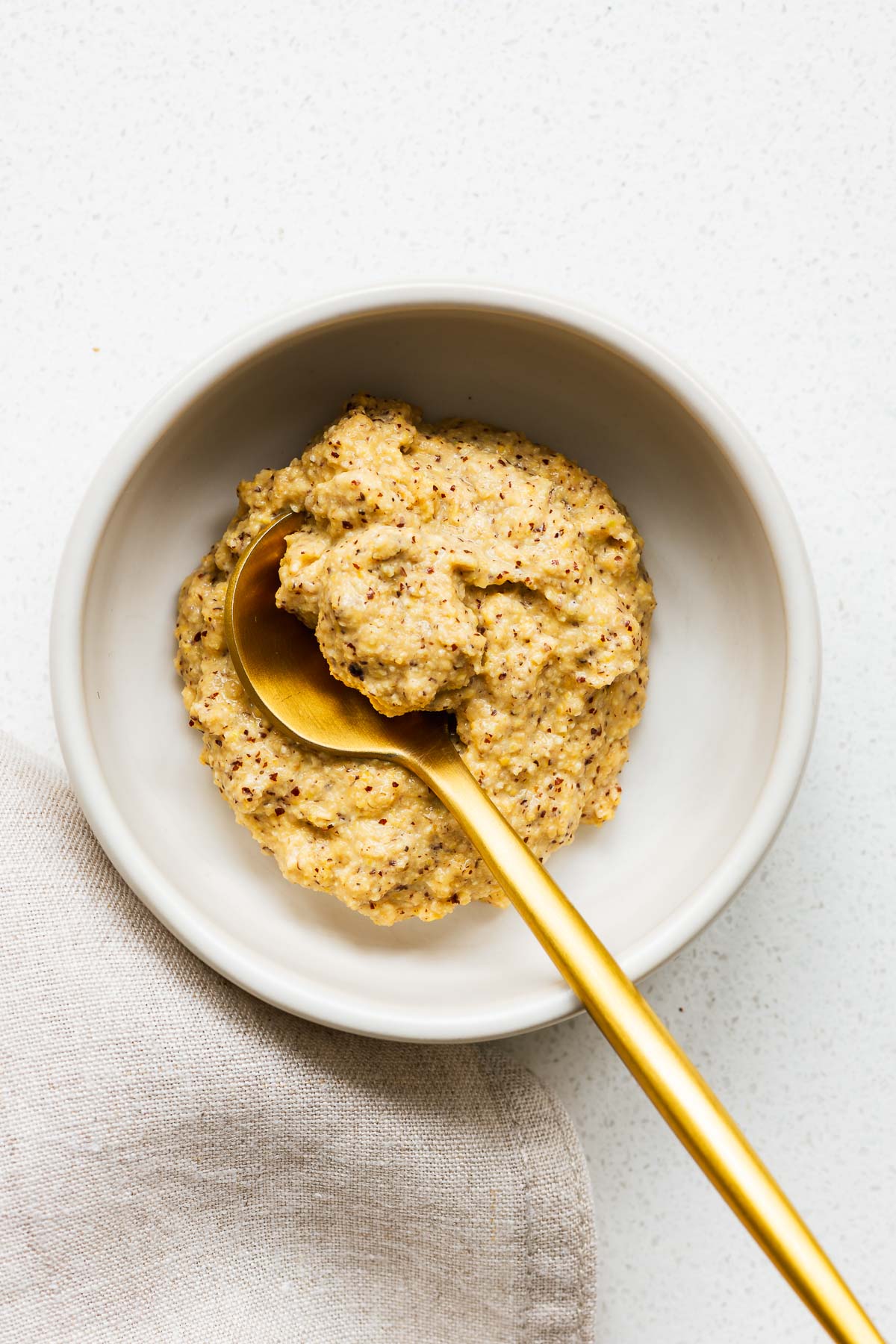
How to use Dijon mustard (and substitutes)
I adore the simplicity of this French mustard – no added spices and flavourings, just ground mustard seeds, white wine, wine vinegar and salt. It is my go-to mustard. And it’s a versatile ingredient in any kitchen.
Dijon mustard is perfect for salad dressings, sauces and spreads:
Salad dressings: Dijon mustard is a great way to add flavour to your everyday salad dressings. Mix a tablespoon of Dijon mustard with honey, olive oil, lemon juice, salt, and pepper. Or try this maple tahini dressing, or hummus salad dressing (made with leftover hummus).
Marinades: Use Dijon mustard in marinades to tenderise and flavour meat or fish. Combine two tablespoons of Dijon mustard with a tablespoon of olive oil, a tablespoon of honey or maple syrup, and some fresh minced garlic for a delicious marinade or cook-in sauce base.
Sauces: Add a tablespoon of Dijon mustard to a simple white sauce for a tangy kick. Or mix it with yoghurt dill sauce to amp up your red potato salad.
Sandwich spreads: Dijon mustard is a great substitute for mayonnaise and other spreads. Or mix it with hot honey for a delicious hot honey mustard spread.
Soups: Give your soup depth of flavour with a teaspoon of Dijon mustard. It pairs especially well with creamy soups and chowders.
Dips: Combine Dijon mustard with Greek yoghurt, tahini or hummus for a creamy, tangy dip. Serve your Dijon dip with pita chips, crudités, or as part of a mezze spread.
Frequently asked questions
The best substitute for Dijon mustard is a mix of ground mustard seeds, white wine vinegar and salt. But you can also use a different mustard like creole mustard, whole-grain mustard, or spicy brown mustard.
You can replace Dijon mustard with regular yellow mustard. But regular mustard has added spices like turmeric, paprika and garlic. The flavour of regular mustard is less pungent and slightly sweeter, and it has a thinner texture.
Dijon mustard traditionally contains brown mustard seeds, white wine, vinegar and salt. Regular mustard (yellow mustard) uses yellow mustard seeds with added flavouring and spices like turmeric, paprika and garlic. Dijon mustard is stronger and more pungent.
Dijon mustard traditionally contains brown mustard seeds, white wine, vinegar and salt. The mustard is typically smooth and creamy, but can also be stone-ground or whole-grain mustard.
No, you can’t turn yellow mustard into Dijon mustard. Yellow mustard contains yellow mustard seeds and added spices like turmeric, paprika and garlic. French Dijon mustard has pungent brown mustard seeds, white wine, vinegar, and no added spices. But you can use yellow mustard as a substitute for Dijon.
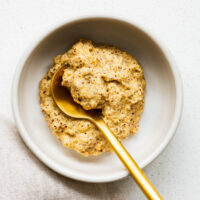
Equipment
Ingredients
- 4 teaspoons mustard seeds
- ¼ teaspoon sea salt
- 1½ teaspoon white wine vinegar
- 4 teaspoons water
Instructions
- Grab a spice grinder or mortar and pestle and grind the mustard seeds with the salt until fine. The finer the mustard powder, the smoother the prepared mustard.
- Mix the mustard seed powder with the white wine vinegar and 2 teaspoons of water. Mix and add the rest of the water one teaspoon at a time. If the mixture is still too thick, you can add another teaspoon of water.
- Let the mixture sit for at least 5 minutes before using.
Notes
- Brown mustard seeds are the traditional choice, but yellow mustard seeds work well too. You can also mix yellow and black mustard seeds as I like to do.
- If you don’t have a pestle and mortar or spice grinder, you can use dry mustard powder instead of mustard seeds, but the result may be closer to yellow mustard than Dijon mustard if your mustard powder contains turmeric. You will also need to add more water.
- Refrigerate leftover Dijon mustard substitute in an airtight container for up to 1 week.
- See the full post for more Dijon mustard substitutes and ideas.
